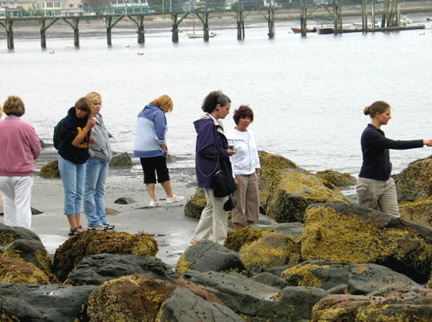Expanding Marine Science in Elementary School Curricula
Summer Institute: Surveying the Shore
Northeastern University's Marine Science Center held the first three days of an Ocean Science Education Institute (OSEI) on July 9-11, 2007. K-5 teachers from both the Swampscott and Nahant school districts were joined by scientists from Salem State University, Salem Sound Coastwatch, and Northeastern University to assist in translating current research and topics into curriculum for the classroom, focusing on the New England rocky intertidal zone as well as introducing relevant local marine issues, such as aquaculture and invasive monitoring.
Researchers introduced curriculum topics that can be explored during a walk along a local beach. Dr. Joe Buttner from Salem State University showed teachers how principles of aquaculture can be used in the K-5 classroom and described the history of the soft-shelled clam in Massachusetts. Barbara Warren from Salem Sound Coastwatch brought participants out into the field to survey and identify invasive species that have been affecting the local ecosystem. Dr. Sal Genovese, a Northeastern University faculty member, introduced teachers to surveying methods.
<more below photo>

Lessons and activities created during this workshop built upon past collaboration between the Marine Science Center and one Swampscott elementary school. During OSEI, this seasonal beach walk will be completed three times a year at local beaches within walking distance of each school. The students will learn how to survey fixed quadrants in order to sample barnacle settlement, as well as sampling other ecological processes happening at the rocky beach that may vary throughout the seasons. Students will also share data with their classmates after surveying different beaches in the Swampscott and Nahant area.
Fall Institute: Sharing Curricula
The participants met again on September 10 and November 8, with the focus on the New England rocky intertidal zone. In September, participating teachers from the Swampscott and Nahant school districts, as well as Northeastern PhD candidate Elizabeth Bryson and Outreach Program Coordinator Tracy Hajduk, met at Fisherman’s beach in Swampscott to create permanent quadrats in the rocky intertidal zone. Multiple classes from different schools will use these quadrats to monitor ecological changes at this site as well as other sites nearby, throughout different seasons, and will share data between schools. This trip also gave the teachers a chance to survey the beach that they will be bringing students to in the future, as well as ask any last minute questions about the ecosystem with marine scientists on hand to answer.
On November 8 participants met for the final time at the Marine Science Center. By this time teachers had created a lesson plan and implemented it in their classroom or in the field. Teachers shared their lesson plans with the group, focusing on successes, challenges, and recommendations for future years. This session allowed teachers to receive feedback and support from others who were undergoing the same challenge, that of implementing a marine field-based lesson for the first time. To ensure that lessons will be disseminated through all five schools and both districts, the lesson plans are available to all participants in electronic and paper versions. As an additional method of continued support, a scientist/teacher pen pal system was set up, linking teachers with a scientist who they can turn to with questions as they continue to bring students to the beach. All participants reported that the Institute was a great success, with particular positive emphasis on seeing their students engaged in hands-on marine science and being able to get their feet wet!
Program Results & Evaluation
The final report and evaluation for the Ocean Science Education Institute (OSEI) at the Marine Science Center was completed in the spring of 2008. Overall the evaluation concluded that this Institute was a great success. Highlights from the report indicate that participating teachers were able to learn ways to cover state frameworks using marine science. The evaluation stated that “this response is particularly important because it indicates that the teachers would be able to add ocean concepts to the Massachusetts standards with ease”. Teachers also frequently commented positively on the hands-on portion of the workshop as well as the benefits of collaboration with other teachers in the district.
Teachers were not the only ones who felt that that the Institute was a success. All of the scientists who attended reported they were pleased with the “effectiveness of the workshop in making scientists become aware of the needs of the elementary school teachers and how the scientists can support them”. Most importantly, all scientists also agreed “that the OSEI workshop increased their understanding of the need for teachers and scientists to collaborate”.
Project Manager Tracy Hajduk has been in contact with teachers and administrators from the Swampscott and Nahant school districts to work on planning the next steps for future years.
Contact the Marine Science Center’s Outreach Coordinator Tracy Hajduk for further information about this program or other offerings at the Marine Science Center.